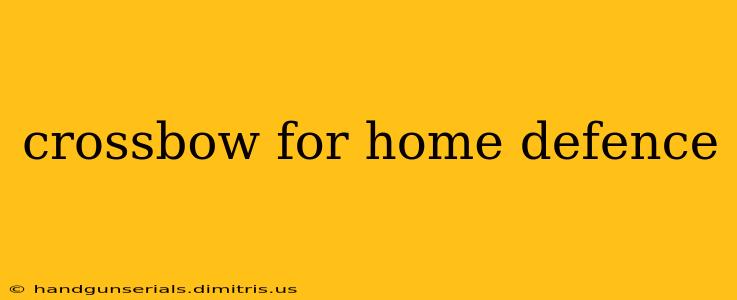Choosing the right home defense weapon is a critical decision, demanding careful consideration of various factors. While firearms are a common choice, the crossbow offers a unique alternative with its own set of advantages and disadvantages. This comprehensive guide explores the viability of using a crossbow for home defense, examining its strengths, weaknesses, and crucial considerations.
The Pros and Cons of a Crossbow for Home Defense
Before diving into specifics, let's weigh the pros and cons:
Advantages:
- Quiet Operation: Unlike firearms, crossbows produce significantly less noise, potentially giving you the element of surprise and minimizing the risk of alerting neighbors or attracting unwanted attention.
- Less Recoil: The absence of explosive propellant means virtually no recoil, leading to greater accuracy and control, particularly under stress.
- Penetration Power: Modern crossbows, especially those with high-poundage draw weights, possess impressive penetration capabilities, making them effective against potential intruders.
- Relatively Simple Operation: Crossbows are generally easier to learn and operate than firearms, requiring less training and practice.
- Less Legal Restrictions (In Some Areas): Depending on your location, crossbows may face less stringent legal restrictions compared to firearms. Always check your local and state laws before purchasing any weapon.
Disadvantages:
- Slower Reload Time: Reloading a crossbow takes considerably longer than reloading a firearm, leaving you vulnerable during a prolonged confrontation.
- Limited Ammunition Capacity: You'll typically carry fewer crossbow bolts than rounds of firearm ammunition.
- Maintenance Requirements: Crossbows require regular maintenance and lubrication to function correctly. Neglect can lead to malfunctions during crucial moments.
- Power Draw: Drawing a high-poundage crossbow requires considerable strength and practice. This can be a significant limitation for some individuals.
- Accuracy Challenges: While less recoil is an advantage, maintaining accuracy under stress requires dedicated practice and familiarity with the weapon.
Choosing the Right Crossbow for Home Defense
Selecting a crossbow for home defense involves careful consideration of several key factors:
Draw Weight:
The draw weight (measured in pounds) determines the power of the crossbow. Higher draw weight generally means greater penetration, but also requires more strength to cock. A balance needs to be struck between power and the user's physical capabilities.
Bolt Type:
Crossbow bolts come in various materials and designs. Choose bolts specifically designed for hunting or self-defense, prioritizing penetration and accuracy. Broadhead bolts are generally preferred for their enhanced penetration.
Safety Mechanisms:
Prioritize crossbows with robust safety features, such as anti-dry-fire mechanisms and automatic safety catches, to prevent accidental discharges.
Accessories:
Consider accessories such as a cocking device (for easier cocking), a quiver for carrying bolts, and a scope or red dot sight for improved accuracy.
Legal Considerations and Responsible Ownership
Before purchasing a crossbow, thoroughly research and understand all applicable federal, state, and local laws and regulations. Responsible ownership includes:
- Safe Storage: Store your crossbow securely and out of reach of unauthorized individuals, especially children.
- Regular Maintenance: Maintain your crossbow according to the manufacturer's instructions.
- Proper Training: Receive adequate training on the safe and proper use and handling of a crossbow.
- Understanding the Law: Stay informed about all relevant laws and regulations concerning crossbow ownership and use.
Conclusion: Is a Crossbow Right for You?
A crossbow can be a viable option for home defense in specific circumstances, offering advantages in terms of quiet operation and reduced recoil. However, its slower reload time and limited ammunition capacity must be carefully weighed against these benefits. Ultimately, the decision depends on individual circumstances, physical capabilities, and a thorough understanding of the weapon's limitations and the applicable laws. Remember, responsible ownership and training are paramount. This information is for educational purposes only and does not constitute legal or professional advice. Always consult with relevant experts and authorities before making any decisions regarding weapons and self-defense.

